Scroll from the bottom up to read in chronological order. And if you haven’t already, check out our previous election coverage here.
11:55pm: Richie Rich.

In Milpitas, wild man Rich Tran coasted to a lopsided victory in a three-way mayor’s race that included former county supervisor Pete McHugh.
I am because of YOU!〽️????☝️ #MilpitasFamiliesFirst #MilpitasFamily #WeAreMilpitas
Posted by Mayor Rich Tran on Tuesday, November 3, 2020
11:50pm: Team players.
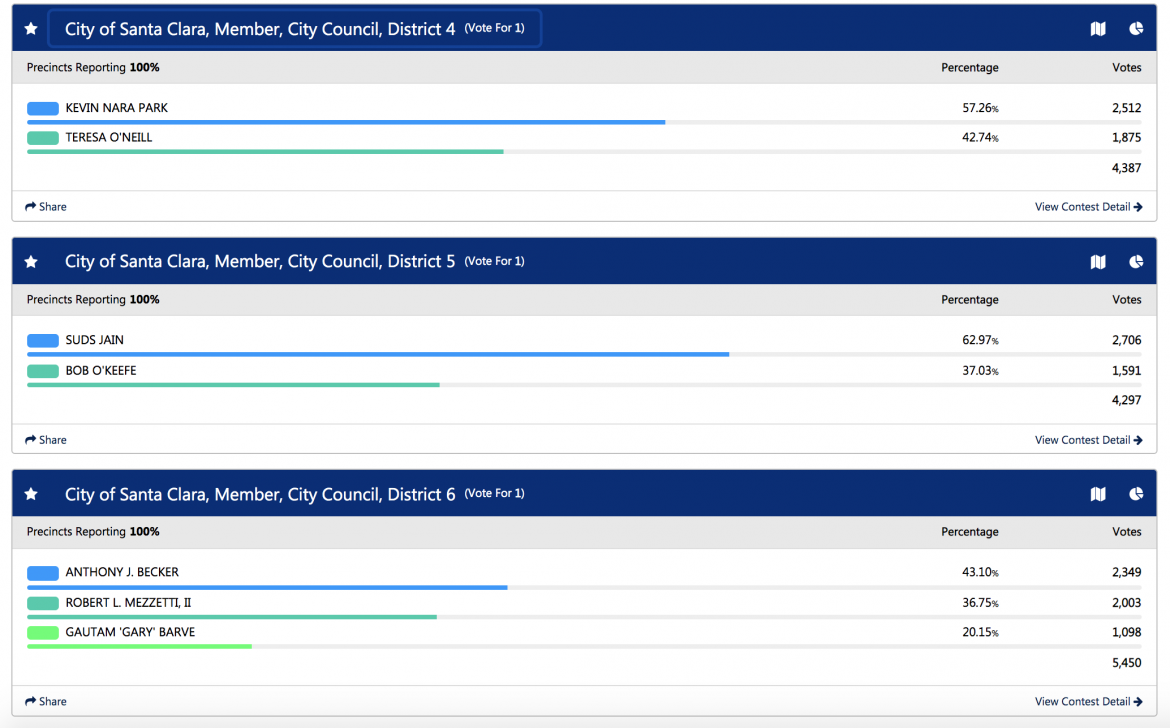
In Santa Clara, where the price of a council seat is now a million bucks a pop, three allies of Mayor Lisa Gillmor crashed to defeat, costing her control of the council majority.
The trio of new council members—Kevin Park, Suds Jain and Anthony Becker—benefited from a $3 million expenditure by 49ers owner Jed York, who was accused of trying to buy the election. The other special interest in the race, big developer Related Santa Clara, also tried to purchase the election, but for 10 cents on the dollar.
A quarter million dollars just doesn’t buy what it used to and discount shopping just doesn’t work in a city that’s up for sale to the highest bidder.
11:40pm: Otto-matic.
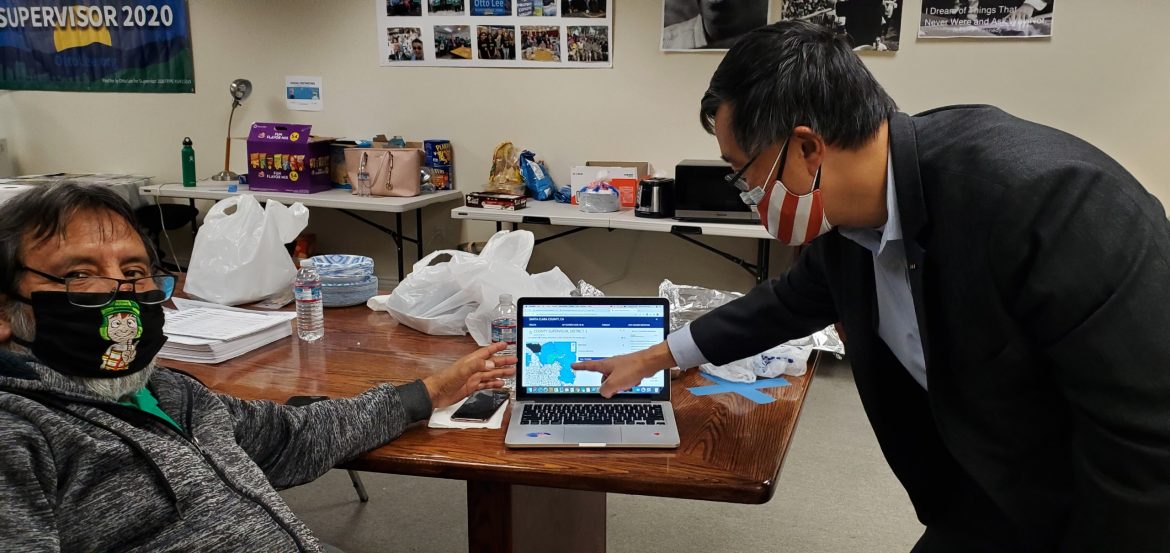
Otto Lee (right) watches the initial returns sway the race in his favor.
Underdog Otto Lee, a former Sunnyvale mayor and intellectual property attorney, finished a four-way spring primary as runner-up to Assemblyman Kansen Chu, whose higher office and past tenure as a San Jose councilman gave him broader name recognition in the Santa Clara County District 3 supervisorial contest.
But the pandemic-prompted health mandates that went into effect right after the March 3 race turned the whole world upside down and upped the stakes in virtually every election.
“Can you believe it?” Lee asked in a phone call from his campaign headquarters in Milpitas. “Campaigning is all about shaking hands, kissing babies and having rallies—but all those things have turned out to be illegal—unsafe in a pandemic.”
“The big issue really wound up being Covid and the economy,” he observed.
When the first rounds of election returns posted, with well over half of the overall ballots tallied, they showed Lee with a decisive lead over Chu.
“We are very, very pleased with the initial results,” Lee said. “We’re looking very good right now and happy to have won Milpitas, [San Jose’s] Evergreen area and Sunnyvale as well. But the night is still young.”
Once he saw where the race was headed, Lee shifted the conversation to the work potentially cut out for him as one-fifth of a county board overseeing a massive hospital system and a stretched-to-the-limit safety net.
“Whoever ends up with this job has their work cut out for them,” he said. “But right now, to be honest, I’m more nervous about the other races—the national ones.”
—Jennifer Wadsworth
11:30pm: Power exchange.
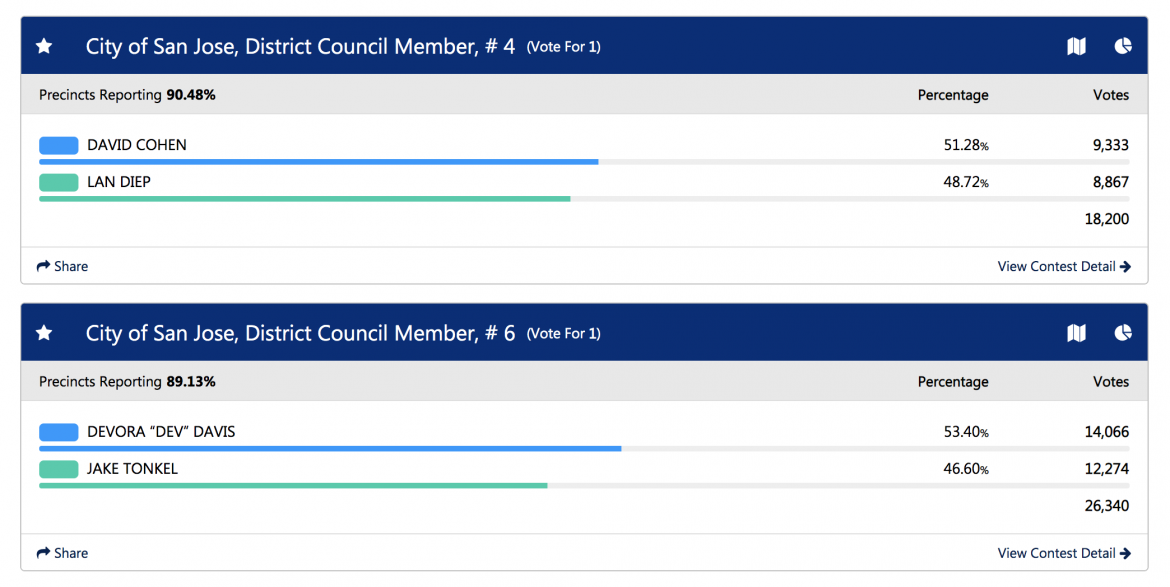
Mayor Sam Liccardo appeared to lose his business-friendly majority as Lan Diep headed to defeat by a several-hundred-vote margin as midnight approached, while ally Dev Davis fended off a hard-fought challenge on the city’s well-gentrified west side.
Though dodging comment on how his Diep-less final two years would look, the mayor excitedly changed subjects to the successful Measure G, which would expand the Independent Police Auditor’s powers, and Measure RR, a three-county initiative to sustain Caltrain.
“This was a measure that was very near left for dead a couple months ago,” Liccardo said of the transit initiative. “I’m grateful several people came together, overcoming a lot of mistrust and disagreement across the region to take a chance in passing a measure that will not just save Caltrain, but enable us to dramatically bolster service in a way that will provide a real alternative to gridlock on 101.”
Incumbent Davis, toggling at her Willow Glen home between the presidential election results on NBC News and reruns of Martin Sheen’s “The West Wing,” said she felt hopeful after the first few rounds of District 6 returns posted late Tuesday.
“It’s looking positive,” she said.
Meanwhile, Davis’ challenger—biomedical engineer Jake Tonkel—celebrated with family at a small outdoor gathering with pizza from A Slice of New York. Despite trailing his incumbent opponent, Tonkel said he felt optimistic with so many votes left to be counted.
“It’s an uphill battle,” he said. “But we’ve been fighting an uphill battle this whole time.”
In North San Jose, Diep spent his evening spending time with his supporters on Zoom and with family members at home.
Even with the election trending toward a victory for his opponent, Berryessa Union trustee David Cohen, the councilman said he didn’t really feel anything. “Obviously it’s not good, but I’m not down for the count either,” he said. “I’ve been here before.”
In 2016, Diep won the primary by a mere 12 votes, so for the time being, he said he’s comfortable waiting until all the votes are tallied.
Cohen also ditched the usual Election night party in favor of a virtual gathering with supporters—although, he did stop by the South Bay Labor Council to watch the first round of returns come in at 8pm.
“I feel good about the lead we have,” Cohen said by phone. “We’re just going to be patient and let the votes get counted and this is the process. I’m cautiously optimistic the trends will hold, but we’ll have to watch and see.”
—Grace Hase
11:20pm: Lucky 13.

Republicans got a mollywhopping up in the 13st State Senate District as well, where Democrat and tech entrepreneur Josh Becker trounced mechanical engineer Alexander Glew for the seat left open by Jerry Hill.
11pm: Lee way.

Alex Lee maintained a commanding lead in the Assembly District 25 race, which covers parts of Santa Clara and Alameda counties. With 56 of the ballots tallied, Lee had secured nearly 74 percent of the 72,000 votes that had been counted in the district, which put him on track to become the youngest lawmaker in the California legislature.
“We are definitely highly encouraged by it right now, but of course the election isn't finalized,” he said in a phone call.
Despite the modest reaction to what seemed to portend a landslide victory, Lee, a Democrat, said the turnout wasn’t a total shocker, noting “our district is very democratic and very progressive.”
During the primaries, his team knocked on 30,000 doors to get the word out about his campaign, but were relegated to virtual and online events due to the pandemic. “A lot of those relationships we built during the primary really paid off or here,” he said.
If by the morning Lee is declared the victor of the AD25 race over perennial GOP contender Bob Brunton, he promised that his values espoused during the election would not be lost in his move to the capitol.
“I am a corporate-free candidate, and I don't take any money from corporations that seek to unduly influence our democracy and I am going to keep that commitment,” Lee said. “I believe in representing my community and not special interests.”
—Janice Bitters
10:50pm: Twenty down.
A ballot measure that aimed to reshape California’s criminal justice system, by making it more punitive, looks poised for overwhelming defeat.
Proposition 20 has just 63 percent of voter support, according to most recent returns, making it one of the biggest landslides out of any of the results for the state propositions. Opponents argued that Prop. 20 would have only made the country’s criminal justice system worse, by allowing some property crimes of more than $250, such as “serial shoplifting” and car theft, to be charged as felonies instead of as misdemeanors.
If successful, the proposition could have effectively reversed work work done by previous voter-approved measures, like 2012’s Proposition 36, which eliminated life sentences for those who violated the state’s three-strikes rule, 2014’s Proposition 47, which reduced punishments for drug crimes and 2016’s Proposition 57, which created a path to parole for some nonviolent offenders.
—Jake Pierce
10pm: An early celebration.

Dave Cortese was hesitant to declare a victory in the Senate District 15 race against Ann Ravel a little after 9pm, but with a more than 15,000-vote lead, he started offering thank-you’s to the team that helped him get to that point.
“This is a wonderful, wonderful, start to the vote count,” he said. “I think we calculated it pretty simply as a 7 percent lead with about 210,000 votes counted already. That's significant. I think all of you who want to celebrate, have a right to start celebrating now.”
Cortese offered an off-the-cuff speech from his East San Jose home, sitting next to his wife, Pattie Cortese, who had just won her own re-election to the East Side Union High School Board of Trustees. Initially the longtime Santa Clara County Supervisor was going to play a pre-recorded message at 9pm, but buoyed by the trajectory of vote count, opted instead to give his remarks in real-time.
Cortese faced off in the race for the open senate seat representing most of Santa Clara County against Ravel, the former chair of the Federal Elections Commission (FEC) who nabbed former President Barack Obama’s endorsement for her run.
Ravel’s campaign manager Andrew Berthelsen didn’t immediately respond to a request for comment on the early results.
As of 9pm, 62 percent of the precincts had reported their votes for the senate district.
—Janice Bitters
9:30pm: The youth vote.
The night was still young for Assemblyman Evan Low (D-Campbell) when the first round of results came in for Proposition 18. Low—who is also up for re-election this year—was one of the co-authors of the state measure that would allow 17-year-olds to vote in the primary election if they turn 18 by the general.
But early returns showed that 53 percent of ballots counted were a “no” vote.
“Of course, this was always going to be an uphill battle given the wide variety of different propositions,” Low said. “However, I’m encouraged by seeing the record turnout, specifically amongst young people and I hope that will make an impact too.”
In Low’s home turf of Santa Clara County, 67 percent of ballots in about 60 percent of precincts counted by 9pm favored a “yes” vote.
Low, who has been a champion of expanding access to democracy, said he plans to reintroduce legislation that would make Election Day a holiday.
“This is the spirit of California to expand voter access,” he remarked.
—Grace Hase
9:04pm: Round two.
In the San Jose’s D4, with 86 percent of the ballots counted, Councilman Lan Diep has managed to narrow David Cohen’s lead down to a few hundred votes.
With 50 percent of the ballots tallied, San Jose District 6 Councilwoman Dev Davis lost a bit of her ground to challenger Jake Tonkel.
Dave Cortese continued to lead the race for the open SD15 seat against Ann Ravel.
The longtime Santa Clara County supervisor had captured 54 percent of the votes that were counted while votes for Ravel accounted for 46 percent.
The next round of returns will be released at 10pm.
—Grace Hase
8:04pm: First returns.
Here we go. Our initial round of results is finally live.
With 49 percent of ballots tallied, San Jose District 4 challenger David Cohen holds a 2,000-vote lead over incumbent Lan Diep.
San Jose’s D6 Councilwoman Dev Davis takes a slight lead over challenger Jake Tonkel.
In the Santa Clara County Board of Supervisors District 3 race, former Sunnyvale Mayor Otto Lee jumped to a big lead over Assemblyman Kansen Chu.
In the race for the 15th State Senate District, county Supervisor Dave Cortese claims a roughly 15,000-vote edge over ex-FEC Chair Ann Ravel.
Democrat Alex Lee starts out with a strong lead against perennial GOP contender Bob Brunton in the 25th Assembly District.
Stay tuned for reactions from the candidates. Next results drop at 9pm.
—Grace Hase
7:15pm: Prop, drop and roll.
While the country tries to glean what they can about who will be America's president for the next four years, Californians also have a whole slew of critically important state propositions to keep tabs on.
Each will change the lives for some part of the population in big ways in the coming years. San Jose Inside will watch closely to see how they fare into the night.
Here are the ones we’ll be monitoring most:
Prop. 15: would mandate commercial properties—but not homes—be assessed every three years and taxed at their current fair market value. Proponents say the measure would generate between $6.5 trillion and 11.5 trillion for local governments and schools. Opponents say the tax increases will trickle down to small businesses and customers. The Santa Clara County assessor is taking a more nihilistic approach: he said none of it matters because it can’t be implemented. Time will tell.
Prop. 16: would reinstate affirmative action 24 years after it was banned, meaning universities and public entities could factor someone’s gender, race or ethnicity into admissions or hiring decisions. Supporters say that it would level the playing field for people of color. Opponents fear it would legalize discrimination.
Prop. 17: would restore voting rights for parolees with felony convictions, allowing them to vote after they’ve served their prison sentence, but before they are done with parole.
Prop. 18: Should 17-year-olds who will be 18 by the time of the next general election be able to vote in primary and special elections? The youth’s voting fate is in Californians’ hands with Proposition 18.
Prop. 19: would let homeowners who are 55 or older, disabled or wildfire and disaster victims to transfer their primary home’s tax base up to three times—up from the one-time move allowed today. The lower tax base could also still be passed to children, but only if those young adults plan to live in the home, or if the property is a farm.
Prop. 20: Prison reforms have been on the California ballot for years, often finding ways to help with the overcrowding in facilities across the state. Prop. 20, may do the opposite by allowing some property crimes of more than $250, such as “serial shoplifting” and car theft, to be charged as felonies instead of misdemeanors.
Prop. 21: would allow cities and counties to pass rent control for more properties than currently allowed, including those built before 2005 and owned by landlords with more than two properties. Single-family homes would be exempt.
Prop. 22: When tech companies spend a couple hundred million dollars supporting an initiative, it’s pretty clear who stands to gain from its passage. In Prop. 22, Uber, Lyft and other gig companies want the state to exempt them from treating their workers as employees instead of independent contractors, which would save them gobs of money.
Prop. 25: Should Prop. 25 pass, it would uphold a 2018 California law that would end cash bail and replace it with a risk-based computer algorithm to decide who gets to stay out of jail while awaiting trial.
Read more about all of the propositions on the California ballot in our earlier coverage and check back here to see how these ballot measures fare.
—Janice Bitters
6:40pm: Do you know the way to San Jose?
With the first wave of results coming out in a few short hours, let’s take a look at some of the most pivotal races for San Jose residents.
Two seats are up for grabs on the City Council this year and both stand to upend the political dynamics of the 11-member governing body.
In District 4, which spans North San Jose and Alviso, Councilman Lan Diep faces Berryessa Union School District trustee David Cohen.
D6, which encompasses Willow Glen, Santana Row, the historic Rose Garden and The Alameda, pits Councilwoman Dev Davis against an upstart progressive challenger: biomedical engineer Jake Tonkel.
Over the last few years, Diep and Davis have both been reliable votes for business-friendly Mayor Sam Liccardo on a council that favors business interests over labor by a 6-5 margin. The two seats have become targets for labor groups that hope to flip the power balance on the council for the remaining two years of Liccardo’s term.
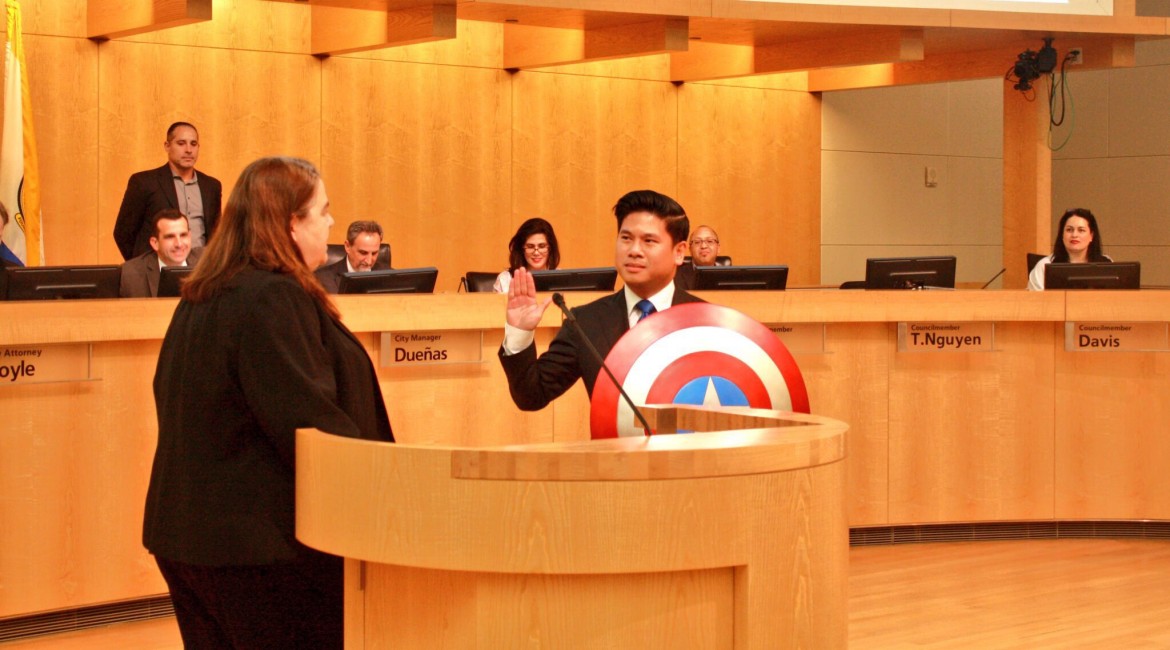
Lan Diep
“We have trust in voters to see through spin and corporate greed to vote for candidates who support working families,” said Jean Cohen, interim executive director of the South Bay Labor Council.
With a record number of ballots already cast even hours before the polls closed, all four candidates told San Jose Inside they felt good about their chances.
Diep, who won his seat in the 2016 primary by 12 votes, said his time in office has taught him “to not contemplate what [he] can’t control and instead focus on what [he] can.” He added: “I didn’t get to do everything I planned to do because I had to adjust to the global pandemic. But I put in my full effort and made the most of each moment I had.”
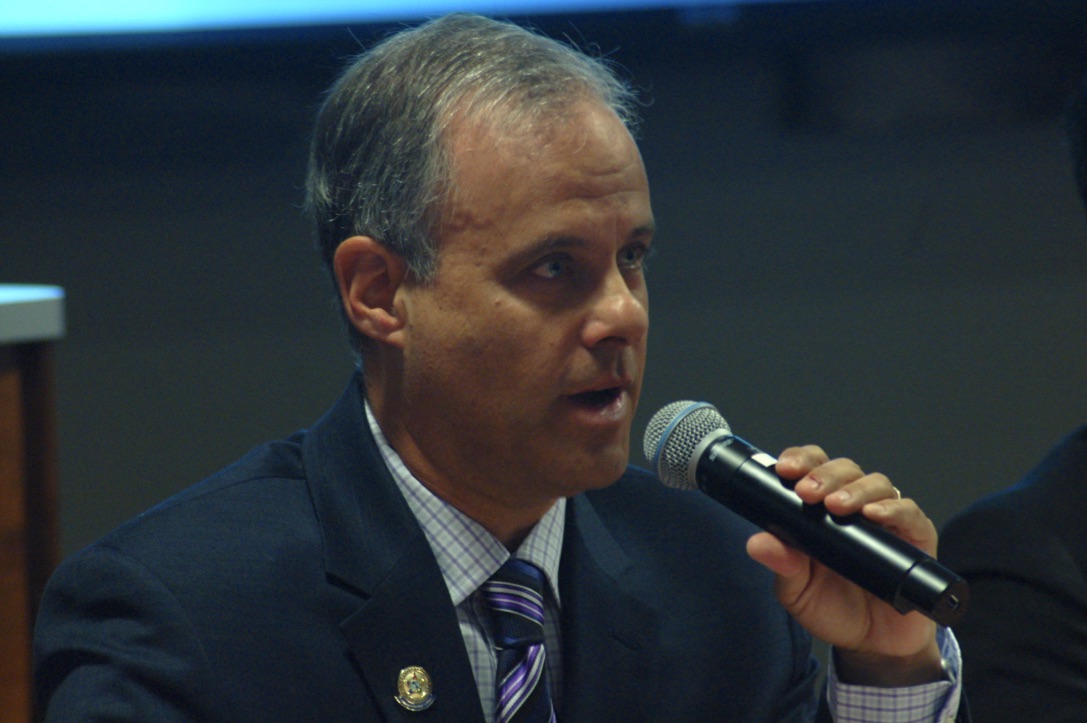
David Cohen
Cohen—Diep’s challenger—said he thought he “ran a good campaign and got [his] message out.”
The school trustee noted the last time the District 4 council race went into a runoff was in 2000 when then-Mayor Chuck Reed bested now-Assemblyman Kansen Chu. Twenty years later, he said, the full D4 electorate will finally have an opportunity to vote—noting that turnout is higher in general elections compared to primaries.
“We knew that this would be a different kind of election because we were going to the general election unlike any other city council race in 20 years,” he said.
In the D6 race, Davis said she was “confident people want an experienced leader.”
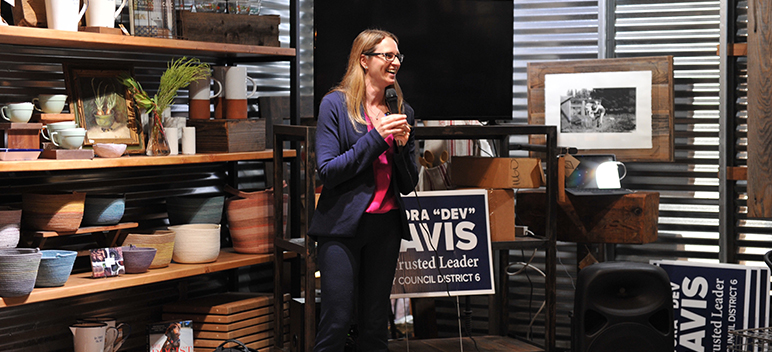
Dev Davis
“These are clearly challenging times,” she said, referencing the Covid-19 pandemic and San Jose’s recent budget shortfalls.
As for the increased voter turnout that could favor the progressive movement, Davis said she thinks “having more voters is better.”
“We want everyone to participate in our democracy and we have a stronger democracy when we do,” she said.
Davis plans on spending Election night at home with her husband and their two kids.
Tonkel said it was hard for him to guess what his prospect will look like once the first round of results post, but the Green Party candidate felt confident because his grassroots campaign put in a lot of hard work.
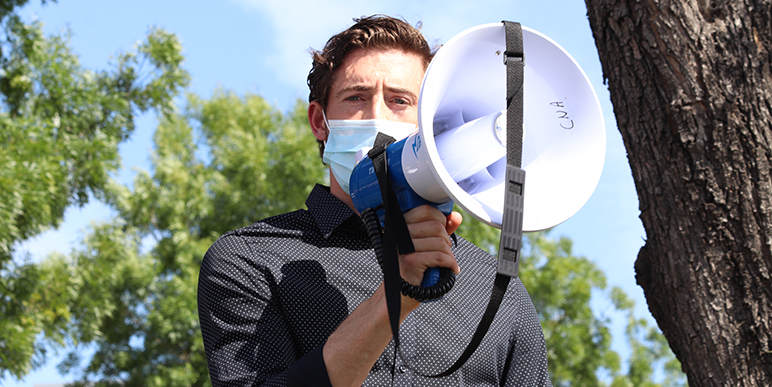
Jake Tonkel
“At the end of this, we’ll sit back and say we put everything on the table,” he said. “We got hit with a lot of negative stuff as well but I think you roll with the punches and I’m excited to see how it turns out either way.”
The political newcomer said that he planned on having a small backyard gathering with his core team, complete with a couple of pizzas, masks and lots of hand sanitizer.
“We’ve been running so much of our campaign over Zoom,” he said. “I think [tonight’s] going to be the best way we can celebrate.”
—Grace Hase
6pm: Mad props.
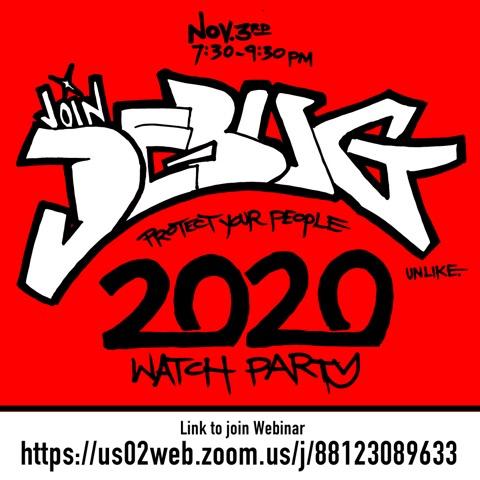
Zoom in if ya’ can.
While virtually everyone else obsesses over which doddering septuagenarian assumes the nation’s highest office, Cecilia Chavez will narrow her focus on a cause closer to home.
The Silicon Valley De-Bug activist—who found her way to the job by battling her dad’s deportation case a decade ago—will host a virtual discussion tonight to watch the election results for a slate of criminal justice initiatives on the California ballot.
There’s Prop. 17, which would allow parolees the right to vote—“that one we support,” Chavez said. Then there’s a rollback of previous reforms rolled up in Prop. 20 and a law that would replace cash bail with algorithmic risk assessments in Prop. 25.
Chavez and De-Bug staunchly oppose those last two, the first for obvious reasons and the second because a computerized risk assessment “isn’t any better,” Chavez explains.
“While it may seem like a good thing to end cash bail—and it is,” she said, “it’s a mirage. Because there’s no follow-through, there’s nothing to replace it with except a risk-assessment tool that’s going to potentially incarcerate more people.”
Chavez said she and her fellow De-Bug activists would rather state lawmakers go back to the drawing board than pass the half-baked reforms pitched in Prop. 25.
“We’d rather see them come up with something that’s centered on the community,” she said, “something that doesn’t center on incarceration.”
The other initiatives that garnered De-Bug’s attention—though unrelated to criminal justice—are Prop 18 and Prop. 22. The former would lower the voting age to 17, which Chavez supports. The latter, which she opposes, would exempt gig companies from extending employee benefits to workers.
“There’s a lot going on with this election, but those are the things we’ll be talking about with these families tonight,” Chavez said.
The De-Bug watch party starts at 7:30pm and will feature a panel of families impacted by the criminal justice system. Click here to tune in.
—Jennifer Wadsworth
5:10pm: Voice of authority.
The FBI, Department of Homeland Security and the Northern California Regional Intelligence Center issued issued the following “unified message” to describe their role in providing public safety during the election:
Although we have no known threats at this time, we are asking for the public’s assistance with addressing crime and threats in our community from those that may be planning violence or attempting to disrupt the election. Public safety measures can only be effective when they involve strong collaboration between law enforcement and the communities that we serve. All federal, state and local public safety and election officials are united in efforts to make this election safe.
One of our efforts relates to suspicious activity reporting, a concept in which law enforcement and homeland security leaders have partnered with communities to ... [share] information reasonably indicative of pre-operational planning associated with terrorism or other criminal activity, while protecting privacy, civil rights and civil liberties.
Law enforcement, homeland security and elections professionals, want to ensure that the public understands how to report suspicious activity to their local law enforcement agency related to the elections. We also want to ensure that all law enforcement agencies understand the process for the collection, analysis, and submission of suspicious activity reports to the NCRIC and the FBI. With your help, [we] will have the ability to identify and stop potential threats of violence in your community.
REPORTING SUSPICIOUS ACTIVITIES OR THREATS OF VIOLENCE:
The public should contact law enforcement via 9-1-1 when an immediate response is needed regarding suspicious activity for any type of crime, including terrorism. Your local law enforcement agency will share your reporting with the NCRIC and FBI.
We are asking the public to call 9-1-1 if they see any of the following suspicious behavior:
• Breach/Attempted Intrusion: Unauthorized personnel attempting to enter or actually entering a restricted area, secured protected site, or nonpublic area. Impersonation of authorized personnel (e.g., police/security officers, janitor, or other personnel).
• Misrepresentation: Presenting false information or misusing insignia, documents, and/or identification to misrepresent one’s affiliation as a means of concealing possible illegal activity.
• Theft/Loss/Diversion: Stealing or diverting something associated with a facility/infrastructure or secured protected site (e.g., badges, uniforms, identification, emergency vehicles, technology, or documents {classified or unclassified}), which are proprietary to the facility/infrastructure or secured protected site.
• Sabotage/Tampering/Vandalism: Damaging, manipulating, defacing, or destroying part of a facility/infrastructure or secured protected site.
• Cyber Attack: Compromising, or attempting to compromise or disrupt an organization’s information technology infrastructure.
• Expressed or Implied Threat: Communicating a spoken or written threat to commit a crime that will result in death or bodily injury to another person or persons or to damage or compromise a facility/infrastructure or secured protected site.
• Weapons Collection/Discovery: Collection or discovery of unusual amounts or types of weapons*, including explosives, chemicals and other destructive materials, or evidence, detonations or other residue, wounds, or chemical burns, that would arouse suspicion of terrorism or other criminality in a reasonable person.
* This activity is not inherently criminal behavior and is a constitutionally protected activity that must not be documented by law enforcement in a suspicious activity report that contains personal identifying information (PII), unless there are articulable facts or circumstances that clearly support the determination that the behavior observed is not innocent, but rather reasonably indicative of pre-operational planning associated with terrorism or other criminal activity.
Race, ethnicity, gender, national origin, religion, sexual orientation, or gender identity must not be considered as factors for reporting (but attributes may be shared in specific suspect descriptions for identification purposes only).
5pm: The votes keep rolling in.
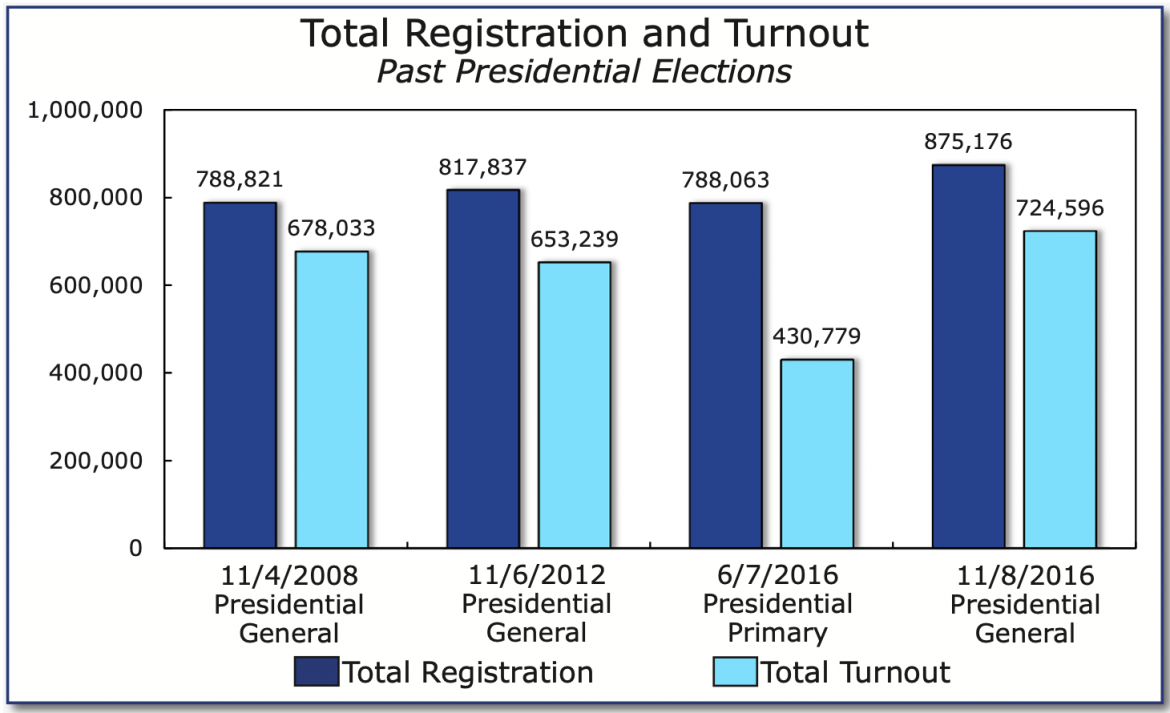
The 2016 presidential general election had the second-highest voter turnout in recent years. (Photo Courtesy of the Santa Clara County Registrar of Voters)
A staggering 710,750 voters have already cast their ballot either by mail or in person at one of the vote centers today, according to ROV spokeswoman Bee Lor.
A total of 1,019,309 people are registered to vote in the county, putting the current voter turnout at nearly 70 percent.
During the 2016 general election, 724,596 out of 875,175 registered voters cast their ballots, making it the second-highest election in terms of voter turnout with 82.8 percent.
If you haven’t voted yet, you still have a few hours to do so. Polls close at 8pm or you can drop off your ballot before then at any drop-off location.
Lor said that the county plans on counting anywhere from 450,000 to 500,000 ballots before releasing the first round of election results at 8pm.
—Grace Hase
4pm: Whatever the night brings.
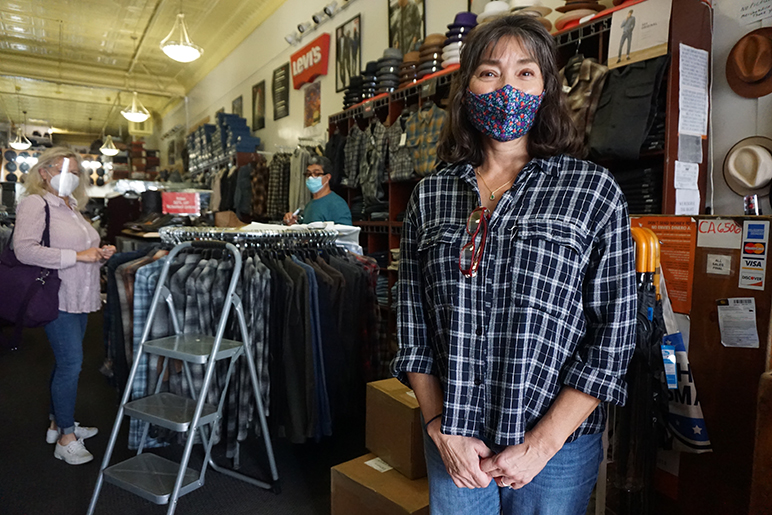
Maria Diaz and her husband man the shop, ready for anything. (Photo by Jennifer Wadsworth)
Diaz Menswear survived the protests earlier this summer unscathed. And when I popped in to see how the proprietors felt heading into an election night that may inspire more protests, they seemed pretty assured.
“I’m not really worried,” said Maria Diaz, who runs the haberdashery with her husband, the eponymous Alfredo Diaz. “We felt safe last time and the police do such a good job taking care of us, so I think it’ll be OK.”
The couple—who posted a Black Lives Matter sign in their storefront window when the protests over police violence erupted in late May and early June in the wake of George Floyd’s killing—might stay later than usual to keep watch. But otherwise, they expect downtown to weather whatever unrest should arise, if any at all.
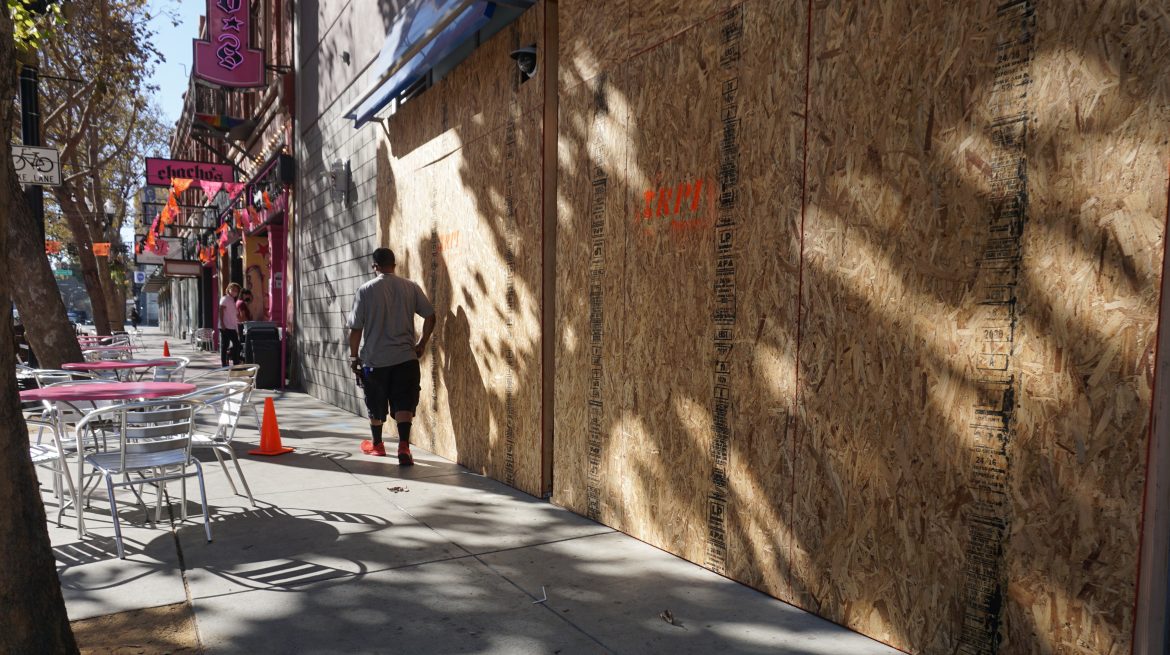
DTSJ has already felt like a ghost town—just a little more so today. (Photo by Jennifer Wadsworth)
Much of the area has been a ghost town anyway since the pandemic forced so many businesses to scale back or shutter entirely.
But on a quick walk through the neighborhood, I saw some newly boarded up windows at the 7-Eleven (as I reported earlier), the CommonGrounds co-working space on Second Street and both branches of Chase.
About a block away from Diaz Menswear, I ran into Cody Romanis and Jose Velo, a couple GroundWerx ambassadors tasked with cleaning up downtown’s sidewalks and alleys. Romanis said he’s pretty confident things won’t get out of hand tonight.
“I don’t think it’ll be like the protests in June,” he said.
Velo seemed more apprehensive.
His unease probably had something to do with his next shift starting at 8:30pm, which would put him in the thick of things if protests do end up erupting tonight.
“I’m concerned,” he said. “Hopefully it’s peaceful, but I don’t know.”
—Jennifer Wadsworth
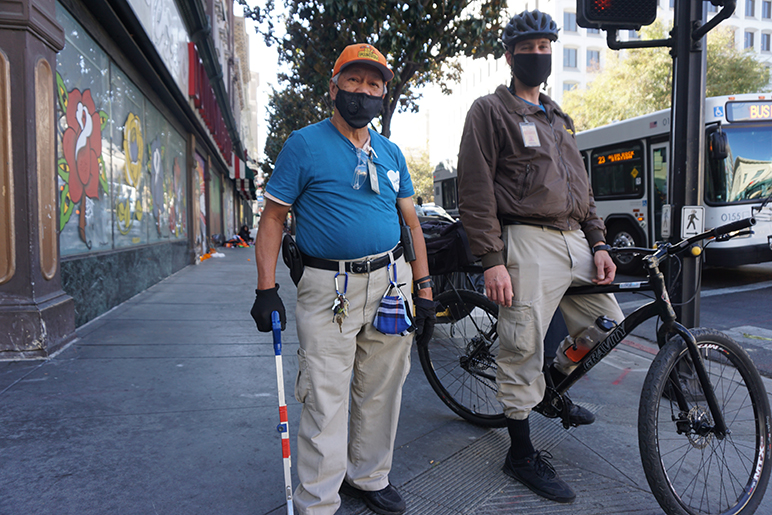
GroundWerx ambassadors Cody Romanis and Jose Velo say they hope for peace tonight. (Photo by Jennifer Wadsworth)
3:30pm: Better safe.
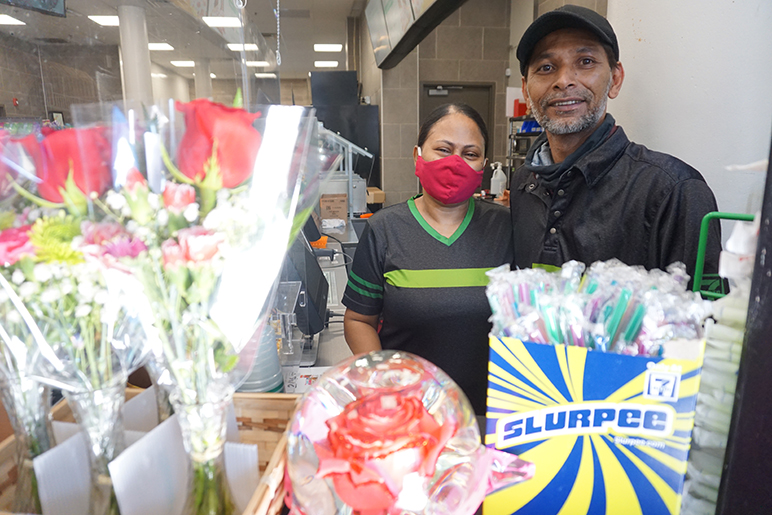
Sunny Shah and his wife have owned the downtown 7-Eleven for the past two years. (Photo by Jennifer Wadsworth)
Sunny Shah said he’s unsure what to expect tonight.
But if police are preparing for civil unrest, then so would he, which is why he boarded up the windows of his 7-Eleven store at Third and San Fernando in downtown San Jose.
“I’m a little bit worried, yeah,” Shah told me from behind the counter, where his wife rang up customers at the shop they bought two years ago. “But I’m not scared. We’ll see what happens. We’ll feel it out.”
Vandals smashed his windows twice already this year. Once during the George Floyd protests, he said, and again a couple weeks ago when a thief broke in and stole all his lottery tickets and destroyed tens of thousands of dollars in inventory.
“That can happen when you work in downtown,” Shah said. “It costs about $5,000 each time, and insurance covers it, but it takes a while.”
Since he lives above the store, Shah said it’s easy for him to keep an eye out. Plus, he said he has a good relationship with customers and has every confidence that fellow downtowners will have his back if things take a turn for the chaotic.
“Whatever way this election goes tonight,” he said, “I just want what’s best for the country. I want people to have good jobs. I want there to be less homeless people out there. I want everyone to be safe and secure.”
—Jennifer Wadsworth
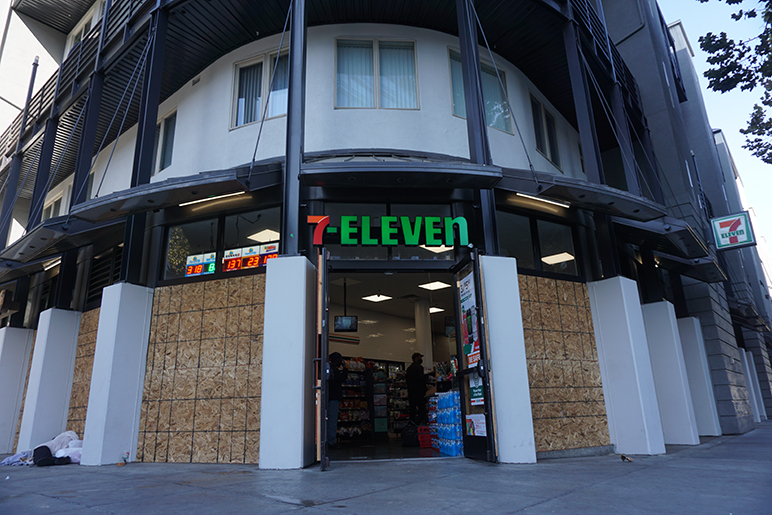
Sunny Shah made sure his 7-Eleven is ready for anything. (Photo by Jennifer Wadsworth)
3pm: Between the lines.
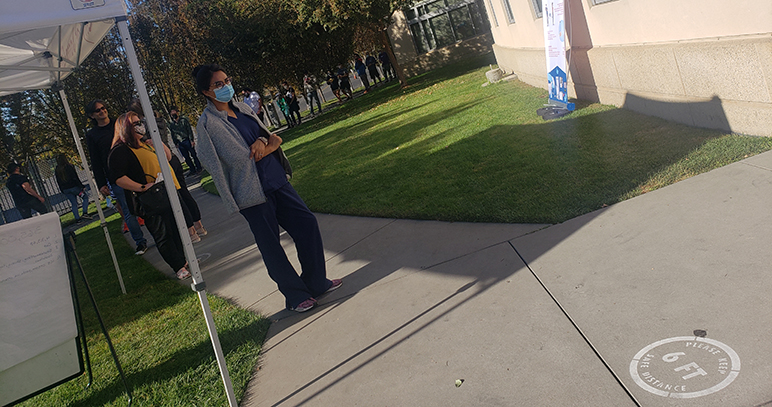
The line stretched around the building at the Central Park library in Santa Clara. (Photo by Jennifer Wadsworth)
When I called the ROV this morning to ask which vote center has proved the busiest, the agency’s spokesman, Ryan Aralar, told us to check out Santa Clara’s Central Park Library off of Homestead. Sure enough, when we arrived a couple hours later, the line—though it moved along pretty quickly—stretched around the building.
“It’s gone back and forth,” said Mohamed Khamal, the lead poll worker at the site. “But it will probably get busier later today.”
By midday, he said, the polling station had already received more than 1,000 ballots—many of them from first-time voters and folks who registered on the spot. Khamal said the poll workers have been doing their best to move things along and making sure the voters in line have what they need, whether that means a bottle of water and snack or a mask to go inside and cast their vote.
“We have someone checking in on the people waiting, seeing if they’re comfortable, trying to make this a good experience for everyone,” he said. “For me, I feel like this is my duty as a citizen, to make sure that everything goes smoothly, to make sure that everyone here can exercise their right to vote.”
Between Monday and early afternoon Tuesday, Khamal said he had a couple tense moments. Yesterday, a man and his girlfriend showed up in shirts emblazoned with a candidate’s name (he declined to say which one) in violation of electioneering laws. When he asked them to turn their shirts inside out, the woman obliged but the man resisted.
“Something similar happened today,” Khamal said.
When he confronted the second electioneering scofflaw about it, he said the guy asked to see the language of the law. So Khamal said he showed him, unfolding a sheet of paper spelling out the relevant section of the California Election Code which he kept handy for exactly such a scenario. Though that didn’t quite assuage the man’s doubts, maybe it inspired him to do his own research.
“Those were the only two cases so far,” Khamal said. “But I’m not too worried. We have Santa Clara police here, the sheriff’s and our own security. We should be OK.”
—Jennifer Wadsworth
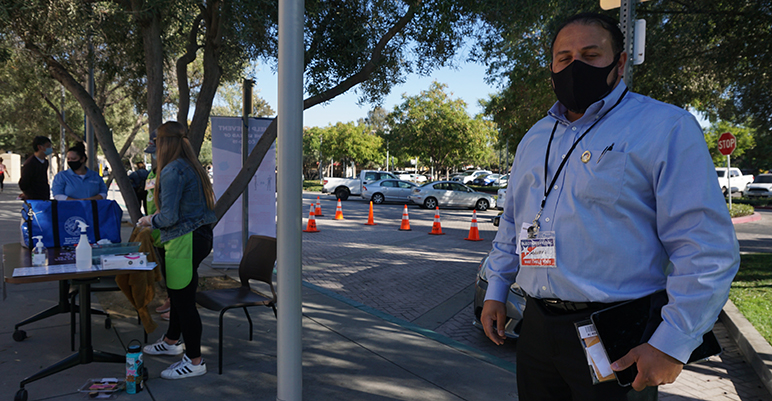
Mohamed Khamal, the lead poll worker at the South Bay’s busiest vote center. (Photo by Jennifer Wadsworth)
1pm: Problem at the polls?

Photo Courtesy of ProPublica
San Jose Inside partnered with ProPublica for its Electionland project this year. Electionland is a nationwide collaboration to investigate voting issues in 2020.
The New York City-based nonprofit news outlet teams up with local and national newsrooms across the county each year to report on problems related to mail ballot delivery, long voting lines, registration problems, purged voter rolls, voter intimidation, broken polling machines and more.
Have problems at the polls? Let us Electionland know in the following ways:
-
SMS: Text the word VOTE, VOTA (for Spanish) or 投票 (for Chinese) to 81380 (standard text message rates apply).
-
WhatsApp: Send the word VOTE, VOTA (for Spanish) or 投票 (for Chinese) to 850.909.8683.
-
Facebook Messenger: Go to m.me/electionland.
To learn more about Electionland visit propublica.org/electionland.
—Grace Hase
12:45pm: Smooth sailing.
Santa Clara County has never seen numbers like these.
By this morning, 660,000 people had already returned their ballots—double the number of early votes we saw in 2016. But there’s plenty of counting left to do.
“We were expecting a high number for this election, so we hired a lot more people just to make sure we could handle all the ballots coming in,” ROV spokesman Ryan Aralar told me in a phone call. “We’re really excited.”
Unlike some states that don’t start counting mailed ballots until after the polls close, California starts processing the votes right away. “We’ve already started,” Aralar said. “We’ve been opening them and they’re already being counted.”
So far, the ROV representative said Election Day has gone without a hitch and with none of the long lines or voter intimidation reported elsewhere in the country.
“So far, so smooth,” Aralar quipped.
—Jennifer Wadsworth
12:30pm: Where to watch.
Election night watch parties at the South Bay’s swankiest bars and restaurants have become a staple for local politicos. But with the United States in the midst of the coronavirus pandemic, most of those events have been canceled or moved online.
But that doesn’t mean you have to bear witness to tonight’s historic results alone.
Here are a few virtual watch parties you might want to check out:
- San Jose City Council District 4 candidate David Cohen is kicking off his election night party at 8:45pm. RSVP on Facebook here.
- Santa Clara County Board of Supervisors candidate Otto Lee starts his watch party at 7pm. RSVP via his campaign’s Google form here.
- California Assembly District 25 candidate Alex Lee’s watch party starts at 8:30pm. RSVP here.
- The NAACP will host a national event from 4 to 7pm that will feature NAACP President Derrick Johnson, journalists Jemele Hill and Ed Gordon, Political Strategist Aisha C. Mills and more. For more information and to RSVP click here.
- The California Democratic Party is hosting an election night celebration from 9 to 10pm. Register to receive a Zoom link here.
— Grace Hase
9:30am: Every vote counts.
Santa Clara County Supervisor Mike Wasserman, who represents Morgan Hill and Gilroy on the Board of Supervisors, issued the following Election Day statement this morning:
I have heard it too many times: “My one vote doesn’t make a difference.” This statement is simply not true. In Santa Clara County alone, several recent races were so close that they triggered recounts, including one race that was decided by a two-vote margin!
The 2000 presidential election was one of the most contentious and closest in American history. After 105,421,423 ballots were cast, George W. Bush lost the popular vote by 543,895, but won the electoral college with 271 votes to Al Gore’s 266.
Looking further back, the 1876 presidential election was marred by allegations of voter fraud, voter suppression and threats of violence. It became the longest and most controversial election up to its time and threatened to tear apart the country.
Finally, on March 2, 1877 Rutherford B. Hayes lost the popular vote to Samuel J. Tilden by some 250,000 votes but won the electoral college by a single vote!Your vote matters. Please return your ballot at any of the county’s 99 drop boxes today or visit a vote center to participate.
It is our duty and our right to pick our representatives. Results will become available after 8pm.
8am: Ready, set, vote.
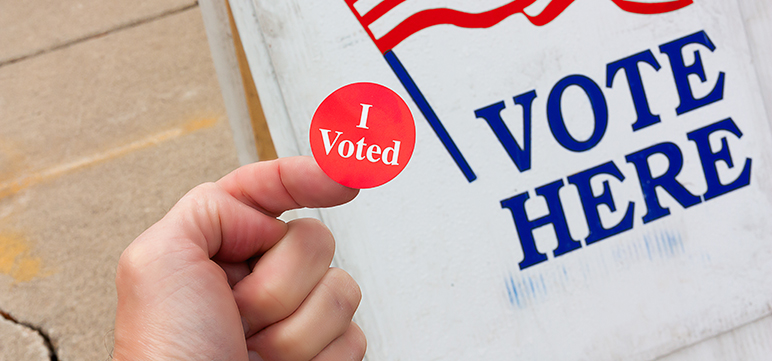
Election day is upon us. (Photo via Shutterstock)
Silicon Valley got off to a remarkably strong start with early voting.
More than 62 percent of Santa Clara County’s 1.1 million registered voters had cast their ballot by the eve of Election Day. That’s well over 90 percent of total votes the county tallied in 2016 and outpaces the early vote rates statewide (55 percent) and across the nation, which saw 99 million ballots returned by the end of Monday.
Record-breaking rates all around.
If you haven’t cast your ballot, don’t worry. There’s still time.
You can still drop it off at one of 99 voting centers—where you can still register to vote, by the way!—or 200 drop-off boxes throughout the county. Click here for a list of those locations, here for a map and here for an address search to find the one nearest to you. Or, you can send it by snail mail, since California accepts ballots as long as they’re postmarked no later than today and arrive no later than Nov. 20.
The four-card ballot that arrived in voters’ mailboxes a few weeks ago is the longest one ever in Santa Clara County, with battles ranging from the presidential to the provincial, with statewide measures and national races to local parcel taxes and city contests. Click here to view the full list of candidates and here for a rundown of local measures.
Just remember: ballots must be completed and submitted by 8 tonight. If you’re waiting for your turn at the booth by the time polls close, don’t sweat it—those queued up by that time will be allowed in, although the line will be capped after that point.
The Santa Clara County Registrar of Voters, which we’ll refer to as the ROV for the rest of the live blog, assured everyone in an announcement today that safety is paramount at the vote centers. Strict adherence to pandemic-related social distancing and sanitation is mandatory. So please bring a mask and other protective equipment. Thankfully, poll workers will have some to hand out if you show up without one.
For more information on voting, please visit sccvote.org, call 408.299.8683, or reach the ROV on its toll-free line 866.430.8683.
The team here at San Jose Inside would like to hear from you, too, as we live-blog the day’s events, checking in with to various local campaigns and, once the clock strikes 8, posting early returns as the ROV reports them. Send tips to editor Jennifer Wadsworth or reporter Grace Hase, @ us on Twitter (here, here or here) or leave a comment below.
— Jennifer Wadsworth

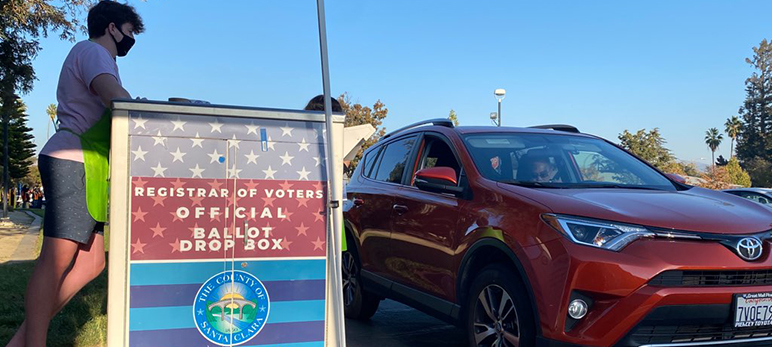
#BidenHarris2020 ?
> CDC says people sick with COVID-19 can break quarantine to vote in-person
https://nypost.com/2020/11/03/those-with-covid-19-can-break-quarantine-to-vote-in-person-cdc/?utm_campaign=SocialFlow&utm_source=NYPTwitter&utm_medium=SocialFlow
Democracy is a “super spreader” event.
{Deep and profound appreciation to Jack Dorsey for allowing me to read this.)
Vote NO on ZOE, she has got to GO!
Voting no on Zoe;
Going is for her a thing.
Return not wanted.
why even vote in a single party state?
self-esteem?